

Masters Of Money: John Maynard Keynes ( 1/3 BBC) The Ideas of John Maynard Keynes « A Critique of Crisis Theory. The ideas of the English economist John Maynard Keynes, 1883-1946, achieved their greatest influence during the 1960s and early 1970s.
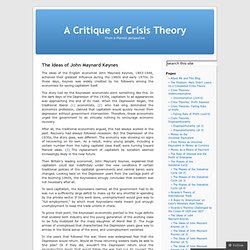
In those days, Keynes was widely credited by his followers among the economists for saving capitalism itself. The story told by the Keynesian economists went something like this. In the dark days of the Depression of the 1930s, capitalism to all appearances was approaching the end of its road. When the Depression began, the traditional liberal (1) economists, (2) who had long dominated the economics profession, claimed that capitalism would quickly recover from depression without government intervention.
Therefore, these economists urged the government to do virtually nothing to encourage economic recovery. John Maynard Keynes and Keynesian Economics. Keynesianism, or Keynesian economics, is a macroeconomic theory that focuses on total spending in the economy and its effects on output and inflation.
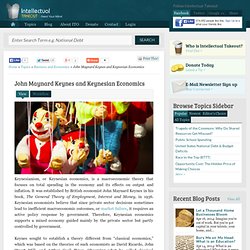
It was established by British economist John Maynard Keynes in his book, The General Theory of Employment, Interest and Money, in 1936. Keynesian economists believe that since private sector decisions sometimes lead to inefficient macroeconomic outcomes, or market failure, it requires an active policy response by government. Therefore, Keynesian economics supports a mixed economy guided mainly by the private sector but partly controlled by government. Keynes sought to establish a theory different from “classical economics,” which was based on the theories of such economists as David Ricardo, John Stuart Mill, and Arthur Cecil Pigou. Observing what he called classical economics' failure during the 1930s, Keynes concluded that the classical theory of markets as self-regulating was wrong.
Trickle Down Theory During Recession " All capitalist economies go through natural ups and downs.
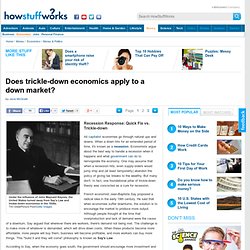
When a down hits for an extended period of time, it's known as a recession. Economists argue about the best way to handle a recession when it happens and what government can do to reinvigorate the economy. One may assume that when a recession hits, even supply-siders would jump ship and (at least temporarily) abandon the policy of giving tax breaks to the wealthy. But many don't. In fact, one foundational pillar of trickle-down theory was concocted as a cure for recession.
French economist Jean-Baptiste Say proposed a radical idea in the early 19th century. According to Say, when the economy goes south, the government should encourage more investment and production. For a long time, most economists and politicians in the United States accepted Say's Law as gospel -- that is, until the Great Depression. It's because Keynes rejected Say's Law that he promoted these stabilizing quick-fixes.
A Point of View: What would Keynes do? 21 July 2012Last updated at 19:52 ET.
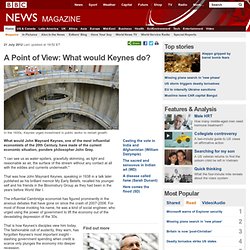
What Is Keynesian Economics? - mobile wiseGEEK. I must ask all future readers to pardon my American perspective.
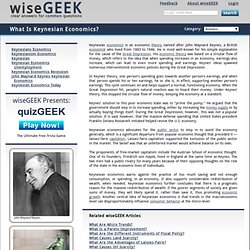
Perspectives resulting from accidents of birth are, of course, such poor marks on an individual's credibility as a thinker. I've noticed an extremely disturbing trend on both sides of the Atlantic. People act as if Keynesian Economics and laissez-faire capitalism are distinct theories. They say that the two are opposed to each other, and pretend that one must choose between them instead of taking the enlightened, educated route, and extracting the grains of truth present in each. Keynesian economics is quite plainly right in its statement that spending supports earning.
Laissez-faire capitalism is also quite plainly right in its statement that individuals will not work if they do not have to. Since it is true that wealthy consumers create healthy economies, and since it is true that work is the only just prerequisite to wealth, the primary goal of economics should be twofold: What we need is a Revolution. John Maynard Keynes Quotes. John Maynard Keynes. John Maynard Keynes is unquestionably the major figure in twentieth- century economics.
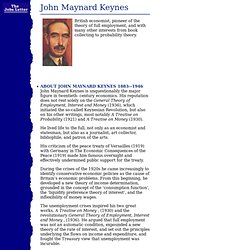
His reputation does not rest solely on the General Theory of Employment, Interest and Money (1936), which initiated the so-called Keynesian Revolution, but also on his other writings, most notably A Treatise on Probability (1921) and A Treatise on Money (1930). He lived life to the full, not only as an economist and statesman, but also as a journalist, art collector, bibliophile, and patron of the arts.
His criticism of the peace treaty of Versailles (1919) with Germany in The Economic Consequences of the Peace (1919) made him famous overnight and effectively undermined public support for the treaty. During the crises of the 1920s he came increasingly to identify conservative economic policies as the cause of Britain’s economic problems. John Maynard Keynes. John Maynard Keynes. Broadcast Yourself. History - John Maynard Keynes. John Maynard Keynes, Economist and Investor.